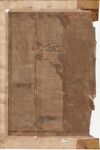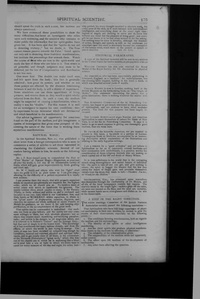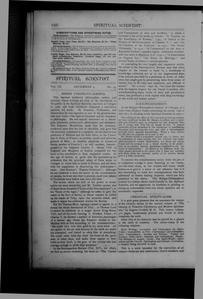< Sad Scenes at Chittenden (continued from page 1-99) >
...
Science and Spiritualism
...
Natural Magic
In the Spiritual Scientist, Nov. 20, was published a short letter from a foreign correspondent who is soon to commence a series of articles to aid those interested in elucidating the Cabalistic sciences. Several of our readers having written to him, he sends us the following replies:
Mr. J. P. Root doesn't seem to comprehend the Root or “First Matter” of Natural Magic—Magnetism, as practised all over the world, is but one of its innumerable variety of fruits, which will gain great improvements by fresh grafting and fresh soil.
Mr. W. V. Smith and others who wish for “light” shall have the guide to it in as plain terms as I can give always allowing for the difficulty of a perfect expression in a totally new science.
I can promise them this much; that with properly organized minds no mystical paraphernalia are required tor the highest order, which we all should aim at. No bamboo wand of seven joints with which to bamboozle the ignorant. The mystic number three, which puzzles so many, is the Ternary Trinity, or Deity without and within us, and is enclosed and included in our own Soul, which is our God father, Son, and Holy Spirit, or WORKMAN within ourselves, to whom in the “great work" of preparation, solution, Regimen, and process we entrust our whole selfhood of seven Planets or Metals for guidance, as we leave it for safe keeping after purification, or the accomplishment of the great work.
That spirits can be commanded is undoubted. Our mediums use them as play fellows, and the spirits not only come most willingly to them, but with absolute pleasure; not so where they require much mystifying and terrifying paraphernalia; and herein is the danger, as all magicians admit, and it is referred to in Bulwer’s “Zanoni” and the Strange Story; but that sort of magic is of the lowest kind. The knowledge of it has overthrown too many nations already, and from the effects of which the world is just trying to emerge. The SOUL of man has been occulted or eclipsed long enough by hereditary, internal and external, physical and spiritual influences, and to get totally clear of all these, is the ultimatum of the Hermetic philosophers’ “great work,” which lifts him out of the chaotic sea in which he is wallowing like a blind eel in mud into a sea of light in which his even-want is cared for every moment of the day and night, his every footstep guided, his every thought moulded in absolute truth, his every pore of the skin, as it were imbued with individualized intelligence, and everything done at the exact right time; legions of angels are desiring to serve and do serve him without any wand but the pleasure of doing good; and every gift he can desire is to be had when wanted or for the asking, but nothing must be done in frivolity, although the freedom of action, thought, and speech, as well as the exuberant joy attendant upon this state is absolutely beyond the conception of the human mind, much more of the powers of speech or pen to describe.
Henry Cornelius Agrippa
This eminent mediaeval philosopher, author, and scientist, whose writings are soon to be introduced to the public in the Spiritual Scientist, was born at Cologne in 1486, and from childhood displayed a marvelous aptitude for study. By Erasmus, Trithemius, and Melancthon he was regarded as one of the greatest men who ever lived — “the light of literature and an ornament to philosophy. He was equally renowned as a theologian, physician, jurisconsult, philosopher, and alchemist. The Emperor Maximilian made him his secretary, conferred upon him the title of chevalier, and gave him the honorary command of a regiment. At one time he was professor of Hebrew and the belles lettres, at the University of Dole, in France; at another, syndic and advocate general of Metz; at another, physician to Louisa of Savoy, mother of Francis I.; at still another, historio-<... continues on page 1-101 >
Editor's notes
- ↑ Science and Spiritualism by Olcott, H. S., Sun, The
- ↑ Natural Magic by unknown author (signed as Lex et Lux), Spiritual Scientist, v. 3, No. 15, December 16, 1875, p. 175. Text restored from alternative source.
- ↑ Henry Cornelius Agrippa by Olcott, H. S., Spiritual Scientist, v. 3, No. 14, December 9, 1875, p. 162
-
Spiritual Scientist, v. 3, No. 15, December 16, 1875, p. 175
-
Spiritual Scientist, v. 3, No. 14, December 9, 1875, p. 162



